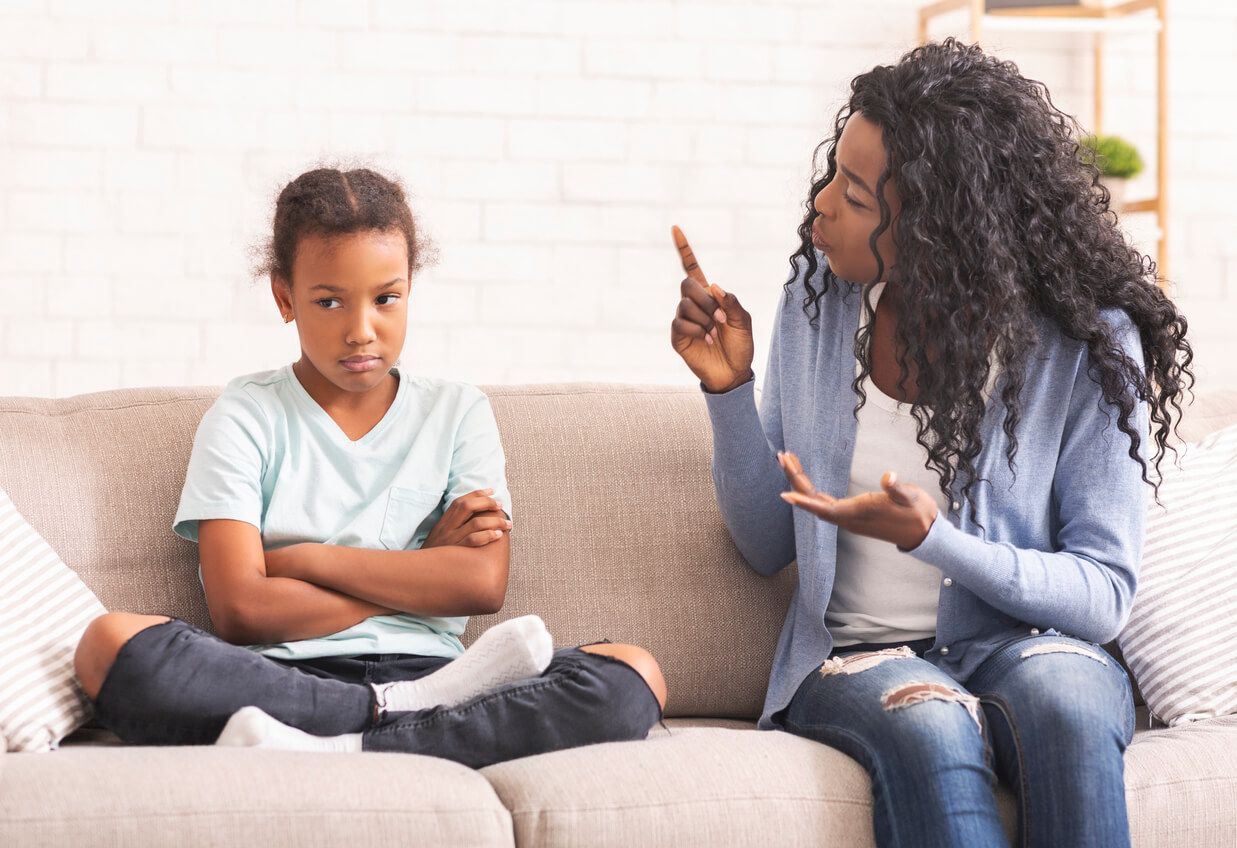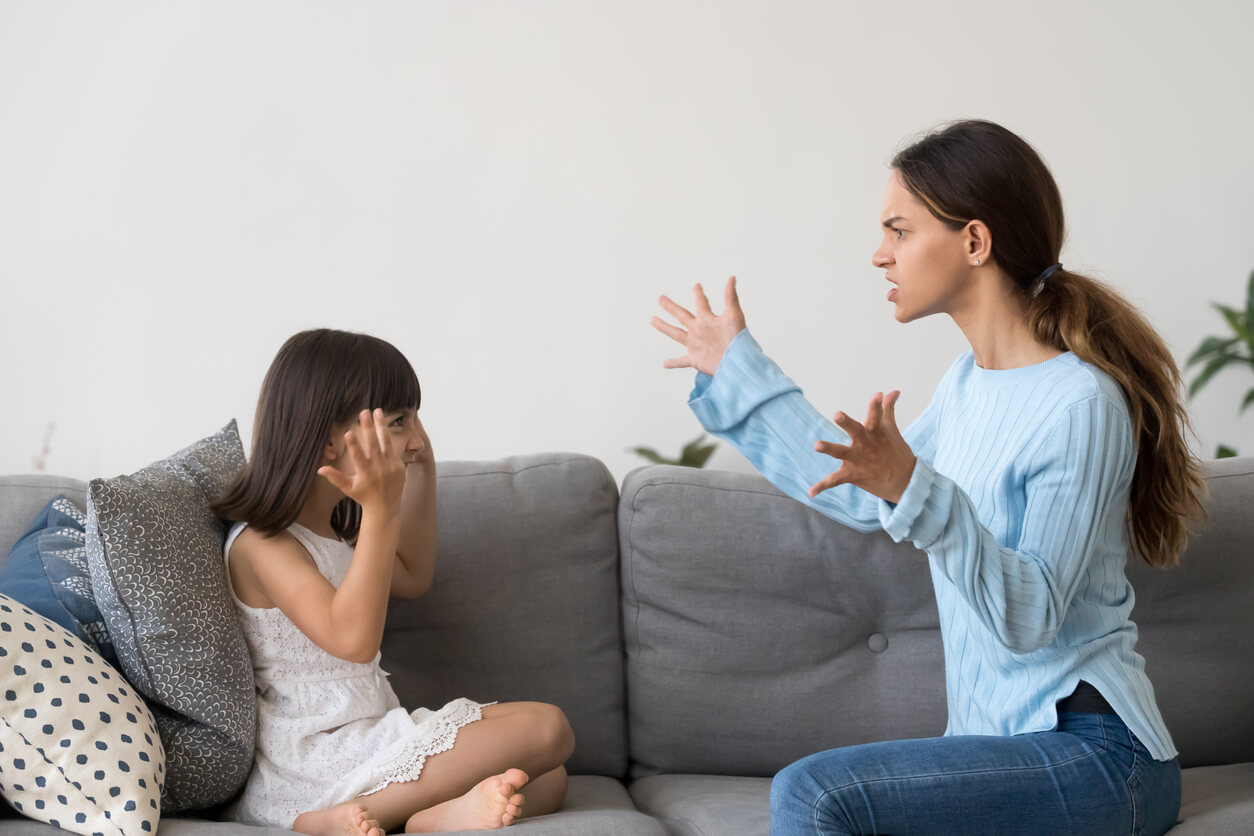11 Phrases You Should Never Say to Your Children


Written and verified by the psychologist Mara Amor López
There are phrases that you should never say to your children because they can be very negative for their growth, development, and self-esteem. The language you use with them is important, and you mustn’t forget that the little ones believe what you tell them, and if this is negative, they’ll take it as a reality.
Words have the power to build or destroy. In this regard, you need to be sure to use phrases that help your children to grow, develop, and have good self-esteem. In this article, we’re going to look at some of the phrases that you should erase from your vocabulary and never say to your children.
Phrases that you should never say to your children regarding comparisons
Comparisons should disappear from our vocabulary because, with them, we make little ones feel inferior and damage their self-esteem. Some of these phrases are listed below.
1. “You should be a little more like your brother”
With this phrase, we damage our children’s self-esteem and, in addition, we make them feel inferior. Therefore, they’ll think that everyone is better than them, when in reality, every person is unique and valuable the way they are, so we should never compare.
2. “When I was your age, I was responsible for all my own things”
We shouldn’t compare ourselves with our children when we were their age. You were you, your child is your child, and you don’t have to be the same. If they have difficulties taking responsibility, help them with small tasks so that little by little, they can achieve it.
3. “You’re just like your father!” or “You’re messy like your mother!”
We usually use these kinds of phrases to highlight some negative behavior of one of the parents. However, we must be careful with them because the child may excuse themself and say that because their parent does it, they can do it too.

More phrases that you should never say to your children
You must erase from your vocabulary all phrases that attack a person’s way of being in a derogatory way. These are detrimental to the formation of your child’s identity, so eliminate them from your language.
4. “You don’t know how to do anything, you can’t do anything well”
This is one of the phrases that can cause the most damage, and that you should never say to your children. Children, like everyone else, will do some things well and others not so well, so we shouldn’t generalize. Instead, it’s better to correct what they don’t do well and guide them to achieve what they have more difficulty with.
5. “I thought you were smarter”
We should never underestimate their intellectual capacity, under any circumstances. What we should do is support and value their decisions, even if they don’t seem right to us or we would have decided differently.
6. “You’re such a pain”
We should never insult or disrespect anyone, but much less our children. Insults are verbal aggressions that harm people. In the case of children, this is much more true, as they’re in the midst of their development.
7. “I can’t stand you”
Maybe at some point, in the face of certain behaviors in your children, you’ve uttered this phrase, but you have to arm yourself with patience. Many times, these reactions come from our own problems, rather than our children themselves. It would be good to reflect and see why you react this way.
Phrases that you should never say to your children because they fail to validate their emotions
If we use certain phrases, we can damage the good construction of the emotional identity and the development of our children.
8. “You look ugly when you cry” or “Real men don’t cry”
Why can’t boys or girls cry? Crying is the expression of an emotion (sadness, anger, surprise), just like laughter (joy). Therefore, you should never say these kinds of phrases to your children. If your child cries, it’s because they need to. Therefore, you must accompany them in that emotion.

9. “On top of everything, you’re angry?”
Of course, we all have the right to get angry, including children. There’s no need for the reason for their anger to coincide with ours.
10. “I like you better when you’re quiet”
We should never tell our children to be quiet because when they want to tell us something, they’ll think we don’t want to listen to them. We have to let them talk as much as they want and we should ask them questions to make them tell us things instead of waiting for them to do it spontaneously.
11. “You don’t coming with me that angry”
This is another phrase that you should never say to your children. When a child gets angry, what they need most is our support, not our rejection. With this phrase, we deny them our company in those moments.
About the phrases you should never say to your children
Surely, after reading this article about the phrases we should never say, you’ve realized that some of them have been pronounced in your family. Surely, you did so without realizing that these phrases hurt our children and, in addition, they don’t help them in their growth and maturity.
Now that you know some of the phrases that you should never say, avoid them at all costs in the education of your children. It’s your children’s health and development that are at stake.
“Education does not change the world, it changes the people who are going to change the world”.
– Paulo Freire –
There are phrases that you should never say to your children because they can be very negative for their growth, development, and self-esteem. The language you use with them is important, and you mustn’t forget that the little ones believe what you tell them, and if this is negative, they’ll take it as a reality.
Words have the power to build or destroy. In this regard, you need to be sure to use phrases that help your children to grow, develop, and have good self-esteem. In this article, we’re going to look at some of the phrases that you should erase from your vocabulary and never say to your children.
Phrases that you should never say to your children regarding comparisons
Comparisons should disappear from our vocabulary because, with them, we make little ones feel inferior and damage their self-esteem. Some of these phrases are listed below.
1. “You should be a little more like your brother”
With this phrase, we damage our children’s self-esteem and, in addition, we make them feel inferior. Therefore, they’ll think that everyone is better than them, when in reality, every person is unique and valuable the way they are, so we should never compare.
2. “When I was your age, I was responsible for all my own things”
We shouldn’t compare ourselves with our children when we were their age. You were you, your child is your child, and you don’t have to be the same. If they have difficulties taking responsibility, help them with small tasks so that little by little, they can achieve it.
3. “You’re just like your father!” or “You’re messy like your mother!”
We usually use these kinds of phrases to highlight some negative behavior of one of the parents. However, we must be careful with them because the child may excuse themself and say that because their parent does it, they can do it too.

More phrases that you should never say to your children
You must erase from your vocabulary all phrases that attack a person’s way of being in a derogatory way. These are detrimental to the formation of your child’s identity, so eliminate them from your language.
4. “You don’t know how to do anything, you can’t do anything well”
This is one of the phrases that can cause the most damage, and that you should never say to your children. Children, like everyone else, will do some things well and others not so well, so we shouldn’t generalize. Instead, it’s better to correct what they don’t do well and guide them to achieve what they have more difficulty with.
5. “I thought you were smarter”
We should never underestimate their intellectual capacity, under any circumstances. What we should do is support and value their decisions, even if they don’t seem right to us or we would have decided differently.
6. “You’re such a pain”
We should never insult or disrespect anyone, but much less our children. Insults are verbal aggressions that harm people. In the case of children, this is much more true, as they’re in the midst of their development.
7. “I can’t stand you”
Maybe at some point, in the face of certain behaviors in your children, you’ve uttered this phrase, but you have to arm yourself with patience. Many times, these reactions come from our own problems, rather than our children themselves. It would be good to reflect and see why you react this way.
Phrases that you should never say to your children because they fail to validate their emotions
If we use certain phrases, we can damage the good construction of the emotional identity and the development of our children.
8. “You look ugly when you cry” or “Real men don’t cry”
Why can’t boys or girls cry? Crying is the expression of an emotion (sadness, anger, surprise), just like laughter (joy). Therefore, you should never say these kinds of phrases to your children. If your child cries, it’s because they need to. Therefore, you must accompany them in that emotion.

9. “On top of everything, you’re angry?”
Of course, we all have the right to get angry, including children. There’s no need for the reason for their anger to coincide with ours.
10. “I like you better when you’re quiet”
We should never tell our children to be quiet because when they want to tell us something, they’ll think we don’t want to listen to them. We have to let them talk as much as they want and we should ask them questions to make them tell us things instead of waiting for them to do it spontaneously.
11. “You don’t coming with me that angry”
This is another phrase that you should never say to your children. When a child gets angry, what they need most is our support, not our rejection. With this phrase, we deny them our company in those moments.
About the phrases you should never say to your children
Surely, after reading this article about the phrases we should never say, you’ve realized that some of them have been pronounced in your family. Surely, you did so without realizing that these phrases hurt our children and, in addition, they don’t help them in their growth and maturity.
Now that you know some of the phrases that you should never say, avoid them at all costs in the education of your children. It’s your children’s health and development that are at stake.
“Education does not change the world, it changes the people who are going to change the world”.
– Paulo Freire –
All cited sources were thoroughly reviewed by our team to ensure their quality, reliability, currency, and validity. The bibliography of this article was considered reliable and of academic or scientific accuracy.
Castañeda, L. (1995). Frases Que Cambian Vidas. Panorama Editorial.
This text is provided for informational purposes only and does not replace consultation with a professional. If in doubt, consult your specialist.








